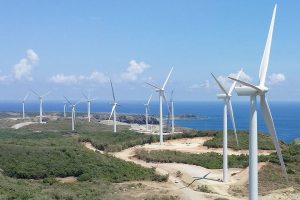By Sheldeen Joy Talavera, Reporter
THE Trump administration’s policies could cause inflation to remain elevated, which would have a major impact on the renewable energy (RE) industry because it depends heavily on borrowed capital, ACEN President and Chief Executive Officer Eric T. Francia said.
“Ninety percent of our capex (capital expenditure) is cost of capital and that remains elevated and more than offsets the low solar panel prices,” Mr. Francia said.
Mr. Francia said President Donald J. Trump’s preference that the US exploit its own fossil fuels to minimize dependence on foreign energy “is causing a lot of uncertainty with regard to mid- to long-term global supply and demand… There is a risk of stranded assets if you overbuild gas resources.”
Mr. Trump withdrew the US from the Paris Agreement, which has been taken as a declaration of intent to lean more on fossil fuels. The resulting resistance by the US to the clean-energy transition has raised concerns that the industry’s progress could stall.
Mr. Francia said in response, the Philippines should explore regional opportunities.
“These global policies are driven by US… (they are) only part of the equation. You need to look at the impact of local and regional policies. And that is where we have a great silver lining, to unlock opportunities in these challenges,” he said.
Mr. Francia added that opportunities also lie in greater efficiency and falling prices of RE equipment, making renewables more competitive.
Energy Undersecretary Rowena Cristina L. Guevara, speaking at the Renewable Energy Forum 2025 on Wednesday, said the US reluctance to pursue RE aggressively means the Philippines can turn to regional partners to achieve its RE goals.
“We can have partnerships among us. And we do have leaders in Asia, like China, Japan, South Korea, and India leading the renewable energy market.”
Citicore Renewable Energy Corp. President and CEO Oliver Tan said investment in energy transition has been “flattish” even before the return of Mr. Trump to office.
“At the end of the day, smart money will eventually find its way to areas where there’s compelling investment (propositions). And the Philippines today is a very compelling investment for funds that will eventually come,” Mr. Tan said.
The Philippines is seeking to increase the share of renewable energy in the power mix to 35% by 2030 and 50% by 2040.
Ms. Guevara expressed optimism in achieving the end-of-decade goal.
“We saw that with the developments happening in the Philippines, we will actually hit 35% by 2030,” she said.

